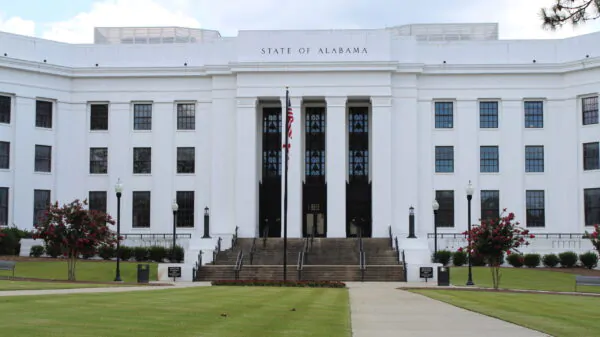A meeting that will potentially impact Alabama for generations is being held at 1 p.m. today, at the office of the attorney general. But the public would know about this important conference if they had only searched the legislative resource site dubbed, ALISON.
However, one would have to know to click on the ‘Meetings & Announcements’ section of The Alabama Legislature website to find when meetings are being held.
The meeting at the office of appointed Attorney General Steve Marshall is the first official gathering of the Ethics Review Council, a group of 22 individuals selected to offer changes to the State’s Ethics Act.
The committee is a result of questions, real and manufactured, about the laws written in 2010, by the Republican Supermajority.
The select committee is absent many of the state’s foremost ethics champions with only a handful of individuals that would have an in-depth understanding of the code.
Most curiously missing are members of the attorney general’s office who actually wrote the majority of SB343, which was originally to be the starting point for the committee’s actions.
Special Prosecutions Divisions Chief Matt Hart, as well as others on his team, are excluded from the discussion. Grave concerns have given way to suspicions that the committee is little more than a rubber stamp giving lawmakers cover when the code is weakened during the 2019 Legislative Session.
Created under a Resolution sponsored by State Senator Arthur Orr, R-Decatur, and Senate President Pro Tem Del Marsh, R-Anniston, the committee’s activities do not fall under the State’s Open Meetings Act, according to the State’s Ethics Commission Director Tom Albritton.
“The way it was set up as purely an advisory committee, it is not subject to the open meetings act,” said Albritton in a phone interview with the Alabama Political Reporter. “But the meetings are public…and posted on the ALISON website.”
This means the committee can meet privately, discuss matters outside of public review and enjoy an anonymity rarely granted a body contemplating sweeping laws with such far-reaching ramifications.
There is also a question of whether the appointed members of the committee are in fact accountable under the current ethics laws?
The idea of an ethics review committee is an outgrowth of the indictment and conviction of former Republican Speaker of the House Mike Hubbard. Since Hubbard’s indictment nearly four years ago, an ongoing battle to weaken the state’s “toughest in the nation’s” ethics laws enacted in 2010. Even though they were championed by Hubbard and the Republican Party, they now face an onslaught of criticism from the same Republicans in the wake of Hubbard’s conviction.
Nearly two years after Hubbard’s sentencing, a war of sorts has been evident among those who want to strengthen and clarify the laws and those pushing to weaken current statutes under the guise of clarification.
Over the last several months, Republican leadership and some rank and file have begun lamenting the state’s ethics laws as a detriment to service. The refrain goes like this, “The ethics laws are so restrictive that only a wealthy individual or a retiree can serve in the legislature.”
Even the resolution that created the review committee hints at the talking-points routinely voiced by GOP House and Senate leadership.
The resolution reads in part, “[T]he multiple piecemeal amendments over the last 40-plus years and the evolving interpretation of the Code of Ethics have created an environment where reasonable individuals can sometimes disagree on what is permitted and what is not with the result that qualified individuals are discouraged from seeking public office.”
Albritton, who co-chairs the committee along with Marshall, says that SB343 will be part of the discussion but other ethics proposals will be part of the mix. Albritton cites an ethics model being written by the American Law Institute. The nearly 100-year-old group, which has always attracted “the elite of the legal elite,” according to reviews, has a partial ethics draft on its website.
ALI’s Government Ethics project, while not complete, focuses, “on standards applicable to the operations of the legislative and executive branches… [including] lobbying, gifts and other things of value given to public officials, conflicts of interest involving the private activities of public officials, the political uses of public office, and administration and enforcement mechanisms.”
As Albritton notes, ALI’s efforts are a work in progress. “The value is that it is the working project of scores of lawyers from all over the country at all levels of government who are approaching basically the same issue that we are here.”
During the 2018 Legislative Session, several ethics bills were put forward and most would have severely undermined current statutes. Hart and Albritton were purposefully blocked from offering commentary and advice by their respective bosses, Marshall and Ethics Commission Chairman Judge Jerry Fielding.
The committee expects to offer its recommendations to the Legislature before the 2019 session.
The committee members are as follows:
- Three members of the Senate appointed by the President Pro Tempore:
- Senator Greg Albritton
- Senator Arthur Orr
- Senator Bobby Singleton
- Three members of the House appointed by the Speaker:
- Representative Alan Baker
- Representative Prince Chestnut
- Representative David Faulkner
- The Legal Advisor to the Governor: Bryan Taylor
- The Attorney General: Steve Marshall/Clay Crenshaw
- The Solicitor General: Andrew Brasher
- The Chief Examiner: Ron Jones/Rachel Riddle
- A district attorney appointed by DA Association: Brian McVeigh, Calhoun/Cleburne County.
- A circuit judge appointed by the CJ Association: Joseph Boohaker, Jefferson County.
- Supernumerary DA: Ellen Brooks
- Two attorneys appointed by the State Bar:
- Christy Crow
- Mike Ermert
- Two attorneys appointed by the Director of LSA:
- Debbie Long
- Bill Rose, Jr.
- ACCA appointee: Sonny Brasfield
- League of Municipalities Appointee: Mayor Ronnie Marks, Athens.
- Two Appointees by the Council of Association Executives:
- Tom Dart
- Kim Adams
- An appointee of the Alabama Press Association: Bob Davis, Anniston Star.




















































